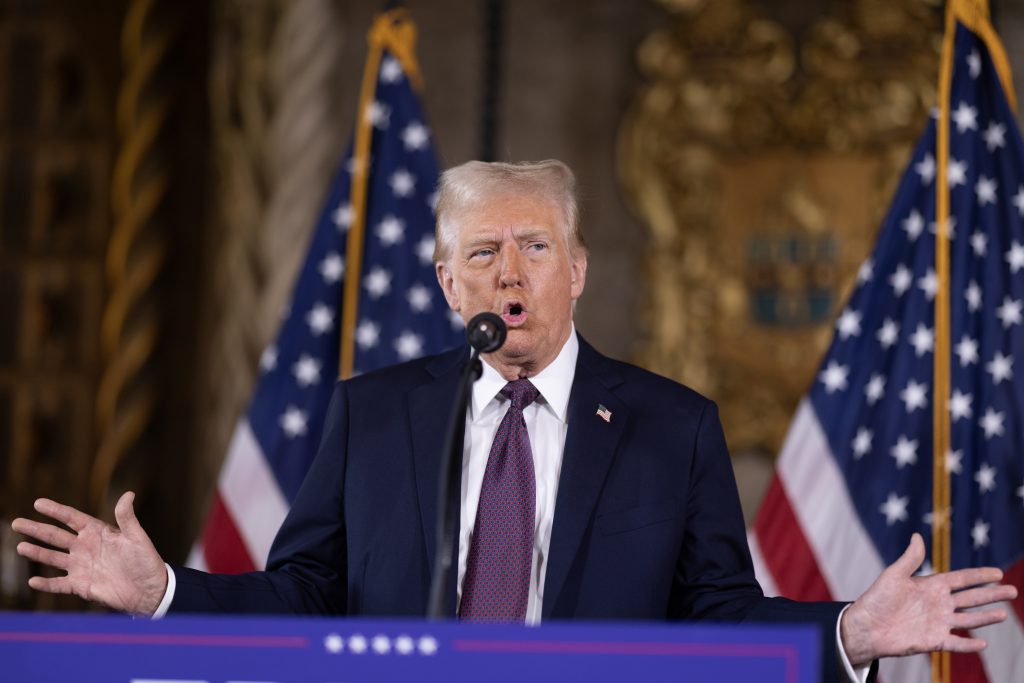

President-elect Donald Trump is set to become President Donald Trump — again. And he’s made a lot of promises about what he’s going to do with his executive power.
On immigration, he’s said he’d like to enact mass deportations and end birthright citizenship (which is constitutionally protected), among other things. He’s made grand pledges on foreign policy, telling Americans he can solve the war in Ukraine as easily as you might open a bag of chips. He’s said he’ll reshape our (and the world) economy with sweeping tariffs. And his allies have hinted at even more unorthodox actions as well, including moves that could gut the federal workforce and classify Mexican cartels as terrorist groups.
The bottom line is, if Trump does even a fraction of the things he and his team have floated, he’s going to radically reshape the United States. However, his vision of the future may not come to pass. A president only has so much power, and Trump is infamously mercurial — perhaps he’ll change his mind. And it may be that matters outside his control (for example, a global pandemic) completely warp his policy plans.
All that to say, it’s impossible to predict just what Trump will do. What is possible, however, is creating a framework for thinking about what might happen during his second term.
To help with that, I asked each member of Vox’s politics team to answer a question: What’s the one thing you think is most important for people to keep in mind as Trump returns to power?
Here’s what they had to say:
Andrew Prokop
The first time Trump was president, no one’s theory of how he’d govern was exactly right.
Trump’s most outspoken critics underestimated how, well, normal his administration would be on many policy matters. Good or bad, much of it was normal Republican stuff. Plus, though Trump often sounded unhinged, there was often at least some method in his madness, as he remained constrained by institutions and checks on his power, and could often be convinced to back down from his bluster.
And yet, there was Trump’s attempt to steal the 2020 election — just one of many instances where he shockingly challenged long-standing democratic norms to try and get what he wanted, going far further than the political cognoscenti expected, and defying his apologists’ claims that he wasn’t as dangerous as he seemed.
So, when will second-term Trump be surprisingly normal? And when will he push the envelope in ways that risk destabilizing the country and the world?
Think policy
Nicole Narea
The first Trump administration reshaped the conversation around immigration for the long haul, successfully framing it around the border and enforcement, while ignoring the contributions of immigrants living in the US.
This time around, he’s said he’d like to go further. However, the policy changes Trump is reportedly considering — mass detention and deportations, ending birthright citizenship, and shutting down the border — are not a real fix to an immigration system badly overburdened and in need of modernization or the factors that cause people to migrate in the first place.
That is, even if Trump is successful in radically altering immigration policy, he’s unlikely to succeed in “fixing” immigration. An actual solution would, for starters, update legal pathways to the US to fit its economic and humanitarian needs, increase staffing levels across the system (not just among immigration enforcement), and quickly and fairly process people at the border.
Eric Levitz
The incoming Trump administration is riven by competing factions. And its internal power struggles could have profound consequences for the next four years of public policy.
Some in Trump’s orbit want to scale back his tariff proposals, while others (including the president) wish to stick to a more radically protectionist agenda.
Incoming Secretary of State Marco Rubio seeks to confront Beijing and protect Taiwan, while Trump advisor Elon Musk maintains close business ties to the Chinese Communist Party and has expressed opposition to anti-China trade policies.
Musk and other pro-Trump tech moguls support guest worker visas for highly skilled foreigners, while deputy chief of staff/homeland security adviser Stephen Miller aims to restrict such visas.
One version of MAGA could lead us toward a global trade war, mass deportation, and confrontation with China — another, toward incremental changes in economic and foreign policies. Much therefore depends on who wins the Trump administration’s civil wars.
Remember that tomorrow isn’t today
Christian Paz
I think it will be important to hold two ideas in our minds at the same time with this new administration: that Trump and his allies will overstep their popularity, and that Democrats will have to pick their fights in order to be an effective opposition.
Trump and congressional Republicans are probably going to operate as if they have a huge popular mandate behind them. Yes, it might seem like all signs are pointing to them having one, but remember this: Trump’s popularity is still historically low and it will probably drop once he begins to govern. Republicans control Congress by single-digit margins.
Still, Democrats are on the back foot. You can probably expect they won’t operate with the same kind of resistance they did eight years ago. They’ll have to evolve, bide their time, and not reflexively condemn Trump every time he does something. The bet is Trump will fumble things, giving Democrats the opportunity — if they are strategic — to capitalize on his mistakes.
Zack Beauchamp
It has become unfashionable to talk about Trump as a threat to American democracy. As if the fact that he won fair and square, and is being treated normally by much of the American elite, has somehow neutralized his inclination to break rules and shatter guardrails.
That tendency, of course, has not been neutralized. The question for the new administration is not whether Trump will take actions that damage American democracy, but how severe that damage will be.
The most important thing in the next four years will be tracking specific policy initiatives — such as Schedule F reclassification of federal employees — that contribute to democratic decline, and developing strategies to avert the worst outcomes.
Keep a level head
Patrick Reis
Tracking Trump is overwhelming for anyone.
He’ll make big proclamations on social media that go nowhere. His team will make major new policies while insisting that nothing has changed. And in the media, all of that will be surrounded by a swirl of accusations and defenses.
So how is anyone to separate fact from fiction?
It starts with patience. When Trump speaks, wait to see if he backs it up. When you hear about major changes, read past the headlines, and seek out outlets that aim to clarify, rather than amplify, the news. A clear-eyed understanding of the Trump administration is possible — it’s just not always possible in real-time.
The politics team, and all of Vox, will have a lot more for you on Trump and his administration in the days, months, and years to come. As the incoming president likes to say, stay tuned!




